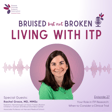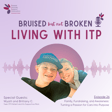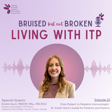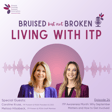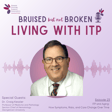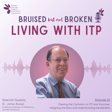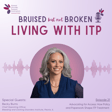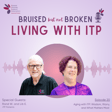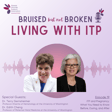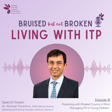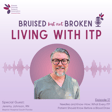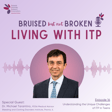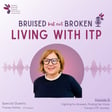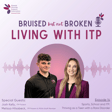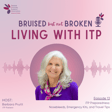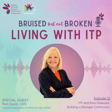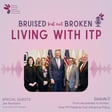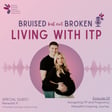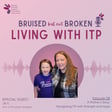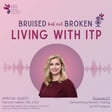Understanding Individual Causes of ITP
00:00:00
Speaker
The science is really advancing so that we can understand the underlying pathophysiology or mechanisms, because we know ITP is such an individualized in a disease. So we can understand maybe what caused my ITP, Barb, as opposed to to what caused your ITP, as opposed to what caused Jen's son's Lucas disease. And as Dr. Kooters, when he ended his plenary session on ITP at ASH,
00:00:30
Speaker
He ended by saying it is a very exciting time to be working in ITP.
Overview of 'Bruised But Not Broken' and ASH Conference
00:00:41
Speaker
Welcome to the PDSA podcast, Bruised But Not Broken, living with ITP. The diagnosis of a bleeding disorder like immune thrombocytopenia may leave you wondering, how can I really live my life with ITP?
00:00:44
Speaker
welcome to the pdsa podcast bruised but not broken living with itp the diagnosis of a bleeding disorder like immune thrombocyopenia may leave you wondering how can i really live my life with itp PDSA's podcast, Bruised But Not Broken, Living With ITP, brings empowering stories, the latest research and treatment updates, lifestyle tips, and answers to the real life questions the
00:01:23
Speaker
Greetings and welcome to Bruised But Not Broken, Living With ITP. I'm your host, Barbara Pruitt. And if you've been a member of the PDSA and ever gone to one of our conferences, I'm sure you've heard about Ash. Well, what is Ash? Ash is actually an acronym for the American Society of Hematology. Every year, Ash has a large conference hosting like 40,000 participants from around the world.
00:01:55
Speaker
These participants include predominantly hematologists from all over the world, researchers that have to do with blood research. We have nurse practitioners, medical students, course pharmaceutical companies, and then there's nonprofit organizations like ours that also attend.
PDSA's Legacy and Global Impact at ASH
00:02:17
Speaker
to learn more about what happens at the ASH conference. Today, I've got two guests with me. and The first one is Caroline Cruz, who is our president and cd CEO of the PDSA, and also Jennifer DiRaimo, who is the Director of Research and Canadian Advocacy. so Welcome to you both.
00:02:41
Speaker
Thank you. Thanks for having us, Barb. Thanks, Barb. Nice to have you all here. And I know that the three of us attended ASH this year, along with a few other people. Caroline, your husband and I, Ken, we end up hosting the PDSA booth, which is there every year on nonprofit row. And you and Peter, the chairman of the board and Jen and Melissa run around. You guys are busy the whole time. So Caroline, fill us in a little bit about what goes on. So this past December and ASH always takes place the first weekend in December was the 66th annual ASH meeting and exhibition. And as you mentioned, there are nearly 40,000
00:03:37
Speaker
clinicians, researchers, pharmaceutical companies, and other nonprofits that attend ASH each year, and really ah folks worldwide to share groundbreaking research in the field of hematology. And PDSA has been exhibiting at ASH for more than 20 years. And as you mentioned, Barb, your husband, Peter, who's PDSA's board chair, he and I were reminiscing about the fact that first time that we attended ASH together was back in 2008.
00:04:14
Speaker
I had attended ASH a couple of years prior to that with PDSA founder Joan Young. I was on the board of directors and I had ah worked for PDSA for a year, so I went with Joan. And at that time, Joan and I would work the PDSA booth in the very, very large exhibit hall.
00:04:35
Speaker
and we would attend educational sessions on ITP. But over the years, the meeting has really expanded. I mean, I'm there from... Wednesday until the following Tuesday. And as you all know, and Jen knows, I mean, we have days sometimes that start at 6 30 in the morning and go till 10 p.m. at night. And Peter and I and and of course, Jen and Melissa Hilsaback, who's also with us, who's our director of community outreach. We're attending meetings almost nonstop with our industry partners, our pharmaceutical partners, while Barb and Ken
00:05:15
Speaker
work the booth for us. So they are our trustee volunteers and have been going for many years. So I don't know, Barb, maybe you want to talk a little bit about what happens at the booth since I'm really not there anymore.
Engagement and Education at ASH
00:05:27
Speaker
Well, you you always tend to kind of pop in and out, you know, between your meetings and and all that, as do our medical advisors, they kind of pop in the booth and out.
00:05:39
Speaker
They have an area where there's booths of nonprofit organizations and we are small and we don't have all the splashy displays that you see at a lot of big conferences or things, but we have lots of information about what the PDSA is and what we do and supporting patients with ITP. So as people walk by our booth,
00:06:04
Speaker
You know, they don't want to have eye contact, you know, they just keep wanting to stroll through. And my my tagline is, hi, do you treat patients with ITP? And if they say yes, I'm like, great, do you know about the PDSA? And then we get into a conversation. I tell them about all we have to offer all the booklets and pamphlets ah that are supportive for the patient so that they're aware of what is going on with them when they get the diagnosis.
00:06:33
Speaker
And it's really quite rewarding when we get a doctor that comes by that says, boy, yeah, I know who you guys are. You're great. You're wonderful. I refer all my patients with ITP to you all. And that's what we want to hear. And every year we hope to have more and more people come by. And we just want to spread the word so that when patients are diagnosed out there,
00:06:57
Speaker
They know where to turn and they know where they can get the most up to date information and their questions answered. So that's what Ken and I do. And Barbara, I was going to say, you know, in in the early years, as you probably remember,
00:07:11
Speaker
people would walk by the booth and they'd see PDSA and they'd look up with this like quizzical look on their face, like who's PDSA or what is PDSA? Although we do have the large letters that say ITP on the booth as well. And then they would see ITP and then they would come over. But most of them didn't know anything about PDSA. And that is the years went on, they would come by and they'd say, oh yeah, you know, I've heard of PDSA.
00:07:38
Speaker
And as you mentioned, I think the majority of people who come by now will say to us, oh, I love your materials. Thank you so much. I pass out your materials to my patients. Or they'll say, what's new? What new booklets do you have? What new articles do you have? And then they'll pick up some materials and and take them along with them. and And now I think we've progressed to the point where we have QR codes and they take a photo of the QR code and they'll go to our website to download our materials. And the QR code is much easier to tote around than a lot of booklets. And yeah and they're also very happy that we've translated a lot of the booklets into other languages because as we said from the beginning, this ASH conference hosts people from all around the world. so
00:08:24
Speaker
you know unless you're staring at their badge and learning where they're from, it it really is amazing the outreach that this organization has. I think it's globally probably the largest hematology conference in the world. it Yeah, it it it is. and And you mentioned the translated booklets. We currently have 37 translated booklets in 15 languages. And there are thousands of foreign doctors who attend this meeting. And in many of those countries, there are no resources for ITP patients. So they're very happy to see our materials and be able to pass those along to their patients and families. Right. Well, it makes me feel good when I ever I can pass that information along. And I know Ken feels the same way.
00:09:13
Speaker
the more we can spread the word, the better.
ITP Breakfast Symposium Insights
00:09:16
Speaker
So one of the biggest things I know with the ASH conference is that the PDSA hosts what we call the ITP breakfast. And that's really a very important part of the ASH experience. So Caroline, tell us about the ITP breakfast. Well, the ITP breakfast takes place on Friday morning.
00:09:41
Speaker
And I should mention ASH's Saturday starts on Saturday. The exhibit hall opens on Saturday, Saturday, Sunday, Monday, Tuesday. But the ITP breakfast is Friday morning and it starts at 8 a.m. and it is a four hour ah scientific symposium organized by PDSA and four of our medical advisors.
00:10:04
Speaker
One of the things about the ITP breakfast is if you want to come, you come early to the ASH conference because it's before the ASH conference. So these people that want to come to it, and I know it's standing room only, it's because they want to be there and learn more about ITP. The breakfast has been taking place for more than 20 years, and it just started out with a small group of doctors sitting and around in a room just talking about the most important ITP research. And then each year it got larger and larger. And in 2016, Dr. ah James Bussell, who's a world-renowned hematologist and ah one of PDSA's medical advisors, he asked me if PDSA would organize and host the annual ITP breakfast. And so, of course, we gladly accepted. and
00:11:00
Speaker
So PDSA organizes it. We work with the four medical advisors on the actual program. There are typically 12 to 14 presentations with physicians from around the world talking about the the latest ITP research and treatments at that breakfast each year.
00:11:21
Speaker
And Jen, I know you sit there with your notepad and listen very carefully to what's being presented. And then you translate it into everyday people talk so we can understand what's going on. And those articles are usually put in our platelet news or our e-newsletter. Is that right? That's right, Barbara. Yeah. What did you find this year that seemed very exciting to you? What did you zone in on?
00:11:48
Speaker
I thought all the talks were really fantastic and I love going to the meeting because it's really an opportunity to, as you said, hear from the experts about the latest and greatest and what's happening in the field. I found this year to be even more exceptional than usual because there was such a great balance of talks and ah ah a huge variety like ranging from everything to understanding better causes of ITP to quality of life to talks on pregnancy and ITP to you know how specific so systems like the gut may contribute to autoimmune disease like ITP. So I thought there was a really good balance of both qualitative and quantitative research. And after the ITP breakfast, I had a chance to talk with a few attendees and they all said the same thing that there was a lot of balance this year. And I think everybody appreciated that because there's something for everyone at the top.
00:12:43
Speaker
That's great. That is. And we look forward to hearing or reading some of your articles and then your future. It always makes as a patient with ITP. It makes me feel hopeful that that there's research actively being done and that there are researchers out there that are actually looking for answers to the questions that we're always proposing to ourselves. You know, like what did I do? How did this happen?
00:13:13
Speaker
There's actually people out there asking the same questions, but they have the opportunity to really research it and try to find some answers. And and some some of the information or some of the presentations were very high level, very scientific. I know some of it went completely over my head. ah But as Jen mentioned, there was also some quality of life sessions, including the impact of ITP on younger people and a couple of very kind of hot button topics, like in general, in in the medical scientific world, talking about the pros and cons of CAR T therapy for ITP.
00:13:55
Speaker
talking about the gut microbiome. And as Jen mentioned, you know what role does does the gut microbiome ah play in autoimmune diseases? And so then Jen takes all of that information and is able to synthesize all of it and write it for a lay or patient audience. And you can read all about it either in the monthly e-newsletter or the quarterly 28-page platelet news.
00:14:22
Speaker
And Caroline, one of the things that the PDSA does at this breakfast, and we do sponsor it, is you give an award. And what is that about?
Honoring Professor Paul Imbach's Contributions
00:14:32
Speaker
So it is called the Macmillan Award, and we established it five years ago, and it is given to a clinician or researcher who's made a huge impact in the field of ITP. And this year, that award was given to a lovely, lovely gentleman, Professor Paul Imbach from Basel, Switzerland. And he is a pediatric hematologist. I've had the pleasure of meeting him in Switzerland on several occasions because he hosts
00:15:08
Speaker
Every three years, he hosts a very important ITP meeting ah where he'll invite around 20 of the top ITP researchers. But the I think Professor Imbach's most important contribution to the field of ITP is that he is the physician that discovered that IVIG will raise your platelet count. And I think for any ITP patient out there,
00:15:38
Speaker
who's listening to this podcast, they have probably had IVIG at least once, if not multiple times. And he is the physician that discovered this would work to raise your platelet count. And we're very thankful for that. He's deserved it, you know, that award quite quite well. I mean, that's been wonderful. That was probably back in what, the 1980s that they started using IVIG, yeah.
00:16:05
Speaker
that's That's great. That's really nice to hear. And I know that he spoke a little bit via video and was very humbled to get the award, which was really nice to hear. Jen, tell us about there was a plenary session. I'm not sure exactly what that means. But Dr. Cooter, who is on our medical advisory board and works at Mass General in Harvard, had ah had a talk. What was that all about?
Promising ITP Treatments: BTK Inhibitor Discussion
00:16:35
Speaker
Yeah. So that was a fantastic talk. And, and for those of you listening who don't know what a plenary talk is, it's a really highly featured talk where there's space for all attendees to attend. So the focus is really on this presentation. And, and it was fantastic that our PDSA medical advisor, Dr. Kutter got to give this really prestigious plenary talk. So his talk was about a drug for ITP patients called rosobrutinib.
00:17:01
Speaker
And so he talked about how it performed in a clinical trial called LUNA, particularly a a late phase three trial. So rosabrutinib is an oral ITP medication. So you take it by mouth and it belongs to a class of drugs known as BTK inhibitors. So a BTK inhibitor inhibits the BTK protein, which controls B cells or our immune cells. And by inhibiting that, it it can increase platelet count.
00:17:29
Speaker
And so he gave a fantastic review of the results that came out of this phase three clinical trial that involved multi centers and really looked at evaluating how safe and effective this drug was in treating adults with ITP over 18 years of age, as well as older pediatric patients between the ages of 10 years of age and 18 years of age.
00:17:54
Speaker
And so the patients that were in this clinical trial had either persistent or chronic ITP. So they had ITP for at least three months, and they were given either the drug Rilsa-Brutinib or they were given a placebo. So a placebo is kind of like a pretend medicine or a sugar pill where it doesn't have any medicine in it. And so some of the participants received the treatment and then some of the participants received the placebo or fake pill, if you will.
00:18:21
Speaker
And so the results were really promising. And I won't go into too much detail because it will be talked about in our quarterly and and monthly publications. But overall, the study showed that rosabrutinib was safe and effective, caused platelet counts to rise quickly. And in some people, they were able to maintain a very durable platelet count. And it reduced bleeding events and the need for rescue therapy.
00:18:44
Speaker
all while improving fatigue and overall quality of life, which is you know exactly what ITP patients are looking for. So currently this drug is under regulatory review with the European Union as well as the US FDA and the target action date in the US is August 29th of this year. So hopefully the drug will become more available and you know especially for ITP patients that maybe haven't responded to other types of therapies, you know maybe this is something that will work for them. So it's exciting. That sounds very promising. I know I happened to speak to Dr. Kutter briefly and he said, wait till next year, this drug's gonna come out. Maybe it'll be a game changer, we hope so. So possibly right before the ITP conference in July, they might receive FDA approval. So we'll we'll have to wait and see
00:19:39
Speaker
But yeah I just wanted to add that the plenary session at ASH is a really big deal. I mean, think of all of the hundreds and hundreds of diseases right related to hematology, bleeding, clotting, and they only select, I think maybe 10 to 20 topics to be presented at this plenary session. And I happened to be in this large auditorium and there had to be at least 10,000 plus people in the room.
00:20:08
Speaker
And the session that Dr. Cooter presented on Rilsa Brutonib was actually introduced by Dr. Donnie Arnold, who from McMaster University in Canada, who is one of PDSA's medical advisors. So he introduced the topic of ITP and then introduced Dr. Cooter. So it's a really big deal because ITP is not always featured in the plenary session at ASH. That is a big deal. and We're so focused on our blood disease, ITP. That's the biggest blood disease in the world to us. But there are like a thousand or more but different blood diseases that hematologists convene at this ASH conference to learn about more, because some of them are a lot more rare than our own blood disease. So there's also, I know, a poster session at ASH. Jen, you want to talk about that?
00:21:06
Speaker
Tell us what that's all about.
Exploring CAM in ITP Treatment
00:21:08
Speaker
Sure. So yeah, we were really excited that we had submitted an abstract for consideration at ASH and they accepted it. And so we were able to present some research from our ITP Natural History Study Registry at ASH. And you know we try to do this because we know that ASH is one of the largest hematology meetings and we always want to make sure that we're bringing forward the patient voice. And so we were really excited to have an opportunity again this year to have a poster.
00:21:36
Speaker
So this year, the PDSA research team coupled with members from the Pediatric ITP Consortium of North America, or ICON, as most people know them. And we partnered together to look at data from our registry, really describing the prevalence and characteristics and reporting of complementary and alternative medicine use among participants in the registry. So particularly the use of supplements and or a specialized diet to to treat ITP.
00:22:07
Speaker
So we had 788 participants in our study and half of them reported using a complementary and alternative medicine. So at least one supplement to treat their ITP and or a specialized diet. And what was interesting Barb that came out of the study that, you know, when we, when in the registry, we ask about complementary and alternative medicine use and only two people are sorry,
00:22:33
Speaker
2% of people had said, yes, they use a complementary or alternative medicine. But yet when they reported out what therapies they were taking specifically to treat their ITP, in addition to traditional therapies, they would report their supplements and or specialized diet. And so it really became clear that the term CAM or complementary and alternative medicine wasn't something that many patients were familiar with.
00:22:59
Speaker
So that you know was a ah big piece of the study. And then we found that individuals that used CAM tended to be older at ITP diagnosis. CAM users tended to have used more standard ITP therapies in the past, and they had a higher level of education compared to those that were just using traditional medicines or had never been treated at all. We didn't find that there was any difference in CAM use by country or race or health insurance or even income level or employment or hospitalization frequency. So we found that CAM use is really common among those living with ITP and that healthcare providers should inquire about CAM use with their patients, specifically supplements and dietary modifications, because you know maybe there is the potential for CAM to interact with drug therapies and you know it's it's good to know about these things. And it's also good to know that if you actually ask specifically about CAM use,
00:23:59
Speaker
Patients may not understand that term. So to really ask specifically if your patient's using a supplement and or a modified diet or something different to treat their ITP. Well, that's interesting because you're you're calling it CAM. Yeah. And and I have to say, i've not I've not heard that. It's probably been around for years. sos Yeah, it's just kind of an acronym for that. Yeah. But even the term when written out fully like complementary and alternative medicine, which is how we have it in the registry,
00:24:27
Speaker
it was very eye-opening to know that that's really not a common term for people. And so it's more important to specifically ask the information you want to receive. Well, that's great. Will you be writing about that in one of the future magazines or, you know, our platelet news? Yeah, absolutely. Yes. Great. That'll be good for people to hear about. Can I put a plug in for the ITP patient registry because the data for this poster that was presented at ASH, that thousands and thousands of ah physicians might have seen while we were at ASH, comes from patient data, comes from patient input. So it's so important to involve the patients and have them share their experiences with us through our ITP patient registry. And the poster hall at ASH is just humongous. And yeah they have poster presentations
00:25:25
Speaker
on Saturday, Sunday, and Monday in the afternoon and in the evening. And during each session, the posters change. So there are just thousands of posters. And so Jen stands in front of our poster for a couple of hours while we're there. And people will come by and ask her questions about the poster and about the data. So it's very exciting for PDSA and for our patient population to be represented at ASH.
00:25:54
Speaker
Yeah, absolutely. And it's always eye opening for me to see like how many clinicians stop and and really truly do want to know more and then they'll share about what they're doing in a similar research space. So it's such a great opportunity to collaborate and really bring forward the patient voice. That's great. Now all of these posters have to do with research, is that correct?
00:26:16
Speaker
Yes, so some is more you know very sciency or um quantitative research and some is more qualitative like ours was where you know you're describing kind of characteristics from the of CAM users that we're getting from the registry. Well, all of this information makes me feel very helpful. um Again, because you know We're always searching for answers and and knowing that we have a presence like this at ASH is really important to me to know that research is going on actively for people like me and the rest of our ITP population.
Pediatric ITP Consortium Collaboration
00:26:56
Speaker
I know you mentioned ICON, and I know that both you and Caroline are very familiar with it. Could you explain a little bit about what ICON is and what happens as far as the PDSA is concerned?
00:27:09
Speaker
Sure. So the ICON is the Pediatric ITP Consortium of North America. ah So it's, gosh, I think they may up to maybe 60 or 70 pediatric hematologists across North America. They collaborate on different studies and PDSA has been a partner with ICON pretty much since its inception, I think 2016, somewhere around there.
00:27:39
Speaker
And a couple of years ago, we started working with them more closely and offer to help support their annual meeting at ASH. So they have an annual dinner program Thursday evening at ASH. And Jen and I attend and we present and we hear about the latest research. And as a matter of fact, the folks from ICON, different doctors from ICON, will write an article on different research projects that they're working on.
00:28:09
Speaker
and how that research can benefit children with ITP. And that article is also published in PDSA's quarterly newsletter. So if you're not getting our quarterly newsletter and you're not getting our e-newsletter, I really encourage you to go to the PDSA website and sign up to to receive that. Well, for both of you, what was your biggest takeaway from the ASH conference that would relate to our ITP community?
00:28:38
Speaker
I think honestly the talks were so amazing and you know there were a couple of talks that really stuck out in my mind that I think will really impact clinical care for ITP. And so I was really grateful to hear these talks and to and to know that researchers care so much and clinicians care so much about patients with ITP that they're involved with this type of thing. So for example, we talked about Dr. Arnold, our our PDSA Canadian medical advisor and his team in Hamilton, Ontario.
00:29:09
Speaker
developed a tool called the platelet variability index where this tool, it's a mathematical tool, but it can measure platelet count fluctuations over time and be used to really identify you know who has primary ITP versus something that looks like ITP but isn't. And that's really important in the research setting and the clinical setting for patients to be able to know like who truly has ITP and who might have something else. And so just to hear about that tool, that left an impression on me for sure. And, you know, Dr. Alison Hart from the Imperial Immune Hematology Centre in England, London, England gave a talk looking at, you know, how the diagnosis of ITP affects young people. And she talked about the Imperial Pediatric Impact Study and looking at, again, quality of life and fatigue and cognition.
00:30:03
Speaker
um And her results were great. One of the things that stuck with me from her presentation what was she said, clinicians should really try to treat vitamin D and iron deficiencies in patients with ITP, which could improve fatigue and quality of life. And that's something that I heard again and again at ASH was this issue of iron deficiency being maybe more prevalent in ITP than we initially thought. And so, you know, just kind of having all these little pieces of the puzzle kind of come together and maybe one day we'll be better able to explain exactly why ITP patients have fatigue and and quality of life issues. And so there were so many things that stuck out. I think every single talk I was like, oh, this is such a great talk and I'm excited to to write it up and and share it with our ITP patient community. But I think those were the two talks that really stuck with me the most because I just thought,
00:30:56
Speaker
The utility of the information that was learned is is just so great. And it's a simple application if it's regarding some supplements. For me, having attended ASH for more than 20 years, it's very encouraging and rewarding to see the patient voice, the patient journey, or they like to call it the the lived experience.
Advancements in ITP Pathophysiology
00:31:20
Speaker
That's like the new buzzword for the patient experience or patient journey lived experience.
00:31:25
Speaker
But it's so rewarding to see that incorporated into so many of these programs. And Jen mentioned the quality of life piece. There were several symposia sessions where PDSA collaborated on the organizer of those sessions. And at the end, they had a slide about PDSA and all our programs and services. Or the one time I happened to look up at at the big screen and they had three very prominent ITP clinicians presenting the program.
00:31:55
Speaker
And they had their slides and I looked up on the screen and I said to Jen, oh, there's our name. They cited our name in some research that we had conducted through PDSA. That is very, very rewarding. And as Jen mentioned, you know, the science is really advancing so that we can understand the underlying pathophysiology or mechanisms because we know ITP is such an individualized you know disease. So we can understand maybe what caused my ITP bar, as opposed to to what caused your ITP, as opposed to what caused Jen's son's Lucas ah disease. And as Dr. Kooters, when he ended his plenary session on ITP at ASH, he ended by saying it is a very exciting time to be working in ITP.
00:32:47
Speaker
That's nice to hear because that's encouraging for other researchers, too, that this is really a cool thing to be looking into. What I've heard, too, is at least when you're doing research in ITP and they're looking at platelet counts, it's easier to determine if this treatment is working or not because you're looking for an elevation in the platelet count and the quality of life of the person also is part of that.
00:33:13
Speaker
well Well, I thank both of you for joining me today and I hope that the information that you all have shared is helpful to our listening community that they feel encouraged that work is going on and answers are coming forth and hopefully all our questions will be answered in the future but there is hope out there so thank you.
00:33:44
Speaker
How do you live your life with a bleeding disorder like ITP? From working in the kitchen with knives, to navigating sharp corners in your house, going out to eat in a restaurant, traveling on a plane, attending a sporting event, even dancing at a wedding.
Lifestyle Tips for ITP Patients
00:34:00
Speaker
ITP patient, Barbara Pruitt, shares her tips and tricks for moving through life with ITP for more than 60 years. Here's her lifestyle lesson for the day.
00:34:14
Speaker
I know as an ITP patient, you probably have thought about this, but what would happen if... That's a big thought. What would happen if something happened to you?
00:34:29
Speaker
Well, my question to you is, do you have something on you that says that you have ITP that says you have a low platelet count? That is really something necessary. And a lot of people avoid that. They don't want to be singled out as being different. But let's face it, we are different. I consider it. We're special. We at least know what we have and we know Every time we listen to podcasts or we learn more about ITP, we that enriches our knowledge so we know what could be dangerous for us too. I know there was a period of time when I was a teenager, I didn't want to have anything um on me that signified that I had a medical issue. But it's really important that you do have something on you just for safeties.
00:35:25
Speaker
reasons. You can have a medical alert bracelet you oh or a pendant or something. The Platelet Disorder Support Association has a platelet store. They've got some things there that you know you could purchase that signify that you have ITP. They also have like a little foldable business card that you could keep in your wallet that says you have ITP and you list on there your doctor's name, your next you know, a kin or a relative or someone to reach in an emergency. Also, it lists your medications. So I think you need to think about this. But your for your own well-being, you really should have something that that tells people that you have a low plate look out and you risk the chance of bleeding. In a future podcast, I'm going to be interviewing a fire rescue person who can
00:36:23
Speaker
Illuminate a little bit more about what they would be looking for if there was an emergency and maybe you were unconscious or something. So in the meantime, think about it. Make sure you've you've got something on you. And that's my lifestyle tip for the day.
00:36:48
Speaker
Thanks for listening to the PDSA podcast, bruised but not broken, living with ITP. Made possible by our presenting sponsor, Amgen. Special thanks to Gus Majorga for composing our theme music. To see what's coming up, visit our website at pdsa dot.org and subscribe wherever you get your podcasts.
00:37:12
Speaker
Please share this podcast through social media with anyone who you think might benefit from the information and stories we share with the ITP and other platelet disorders community. As always, please speak with a healthcare care professional before making any treatment decisions, but know that pdsa dot.org is a wealth of information and resources to help you navigate life with ITP and other platelet disorders.
00:37:40
Speaker
Remember, you are not alone.

